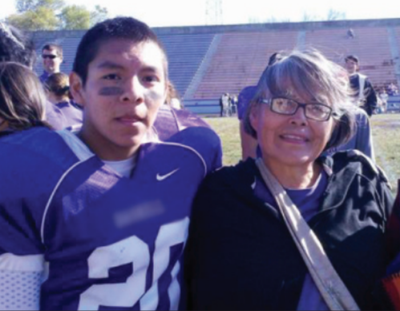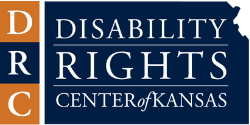Special Education
Right to Service Animal Protected

Looking at the huge smile on Eldon Leighty’s face illustrates his joy at having Gracie by his side. Eldon is 7 years old from the small southwest Kansas town of Manter, near the Colorado border and north and west of Liberal, Kansas. Eldon has a diagnosis of autism and depressive disorder. Eldon has a service dog named Gracie which has been trained and certified by CARES, Inc. to help him manage the manifestations of his autism. Eldon has daily bouts of extreme anxiety, behavior problems, and runs off. He engages in self-injurious behavior and has trouble with transitions.
Gracie is trained to identify when Eldon’s behaviors are escalating and help address the situation by immediately going up to him and touching him to help cease his behavior. Gracie does not require a signal from Eldon to provide this type of support. Gracie provides a calming influence and sense of security which helps Eldon socialize and communicate. She is also trained to assist Eldon in ceasing repetitive behaviors and helps prevent him from other negative actions, such as leaving the school grounds.
Eldon attends elementary school and has an Individualized Education Program (IEP). His parents asked the school district several times to allow Eldon to have Gracie at school to assist him with his functional limitations in order for him to have the best chance to receive a quality education. The request was made pursuant to Title II of the Americans with Disabilities of Act (ADA) and the Rehabilitation Act of 1973. The district refused each time, treating the request as an IEP issue instead of a request for a reasonable accommodation under the ADA and Rehabilitation Act.
A DRC attorney filed a complaint with the Civil Rights Division of the U.S. Department of Justice (DOJ) on behalf of Eldon. The DOJ accepted the complaint and began an investigation. DRC cooperated closely with the DOJ and advocated for Eldon’s rights. A DRC Attorney took great care to make certain that the case was prepared to enforce Eldon’s rights. The DOJ informed the school district that its refusal violated Eldon’s civil rights under the ADA and Rehabilitation Act. After meetings with the DOJ, the DRC attorney, and Eldon’s parent, the school district agreed to a plan to allow Gracie to accompany Eldon at school. At the end of Eldon’s first day of school with Gracie, he called the DRC attorney to say “Thank you for helping me have Gracie at school . . . I’m so happy!”
Eldon’s case offers a strategy to protect and enforce the rights of other students with disabilities to have a service animal at school.
DRC Fights for Students Rights

Leon Ricehill was born with fetal alcohol syndrome. While he had no physical impairments, he struggled with learning disabilities. Leon graduated from an Arizona high school in May, 2010 and applied to Haskell Indian Nations University in Lawrence, KS. Haskell’s admission requirements state that students must meet two of the following three criteria for admission: 1) An ACT score of 15 or better, 2) a GPA of 2.0 or better, or 3) a class ranking that placed in the top 50% of graduating class. Leon missed the ACT requirement by only one point, scoring a 14. His GPA was a 2.96 on his final transcript, thus he met that requirement. The Arizona high school had refused to include Leon in his class’s ranking because he was in special education. Due to these obstacles, Haskell denied him admission for the Fall 2010 semester. Leon’s mother contacted the Arizona P&A for assistance, who referred Leon to DRC.
Attorney Kip Elliot represented Leon and was assisted by intern Jill Carlson. The first thing that DRC had to do was to get Leon’s high school to include him in the ranking system. After numerous phone calls to the high school and school district administration, DRC succeeded in getting the Arizona high school to include Leon in the ranking system. Once he was included, Leon and DRC learned that Leon was ranked 56 out of 235 students. This placed him in the top 24% of his class. Ranking Leon with his class is required by federal law. The school then provided Haskell with an official transcript reflecting the ranking.
Next, DRC had to ensure that Leon was not denied admission because he was a person with a disability. Now that Leon met Haskell’s entrance requirement; Haskell still denied admission. The admissions coordinator claimed that the school could not offer Leon the services that he may need. DRC staff explained to Haskell that they could not deny admission because the school did not want to provide services. Leon was finally admitted four days before the semester began. He played football for Haskell in the fall and is greatly enjoying his experience in Lawrence.
.png)





